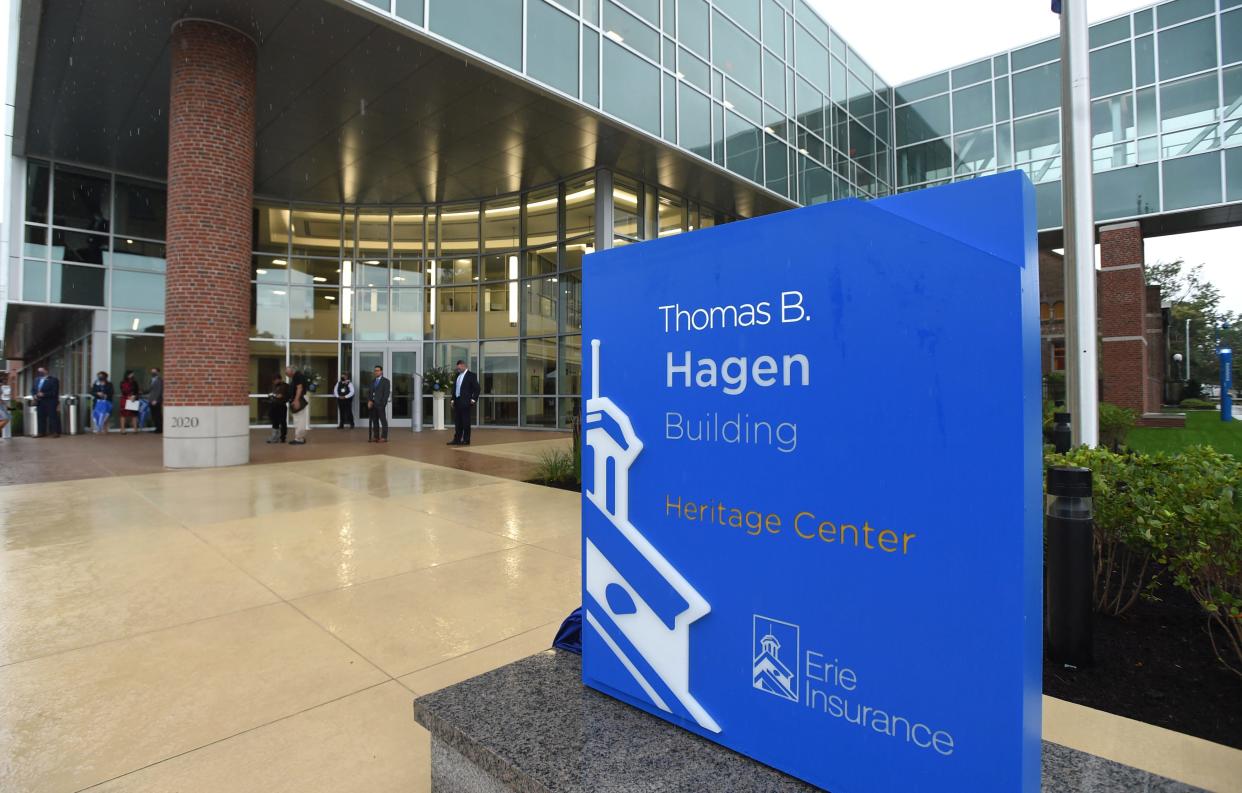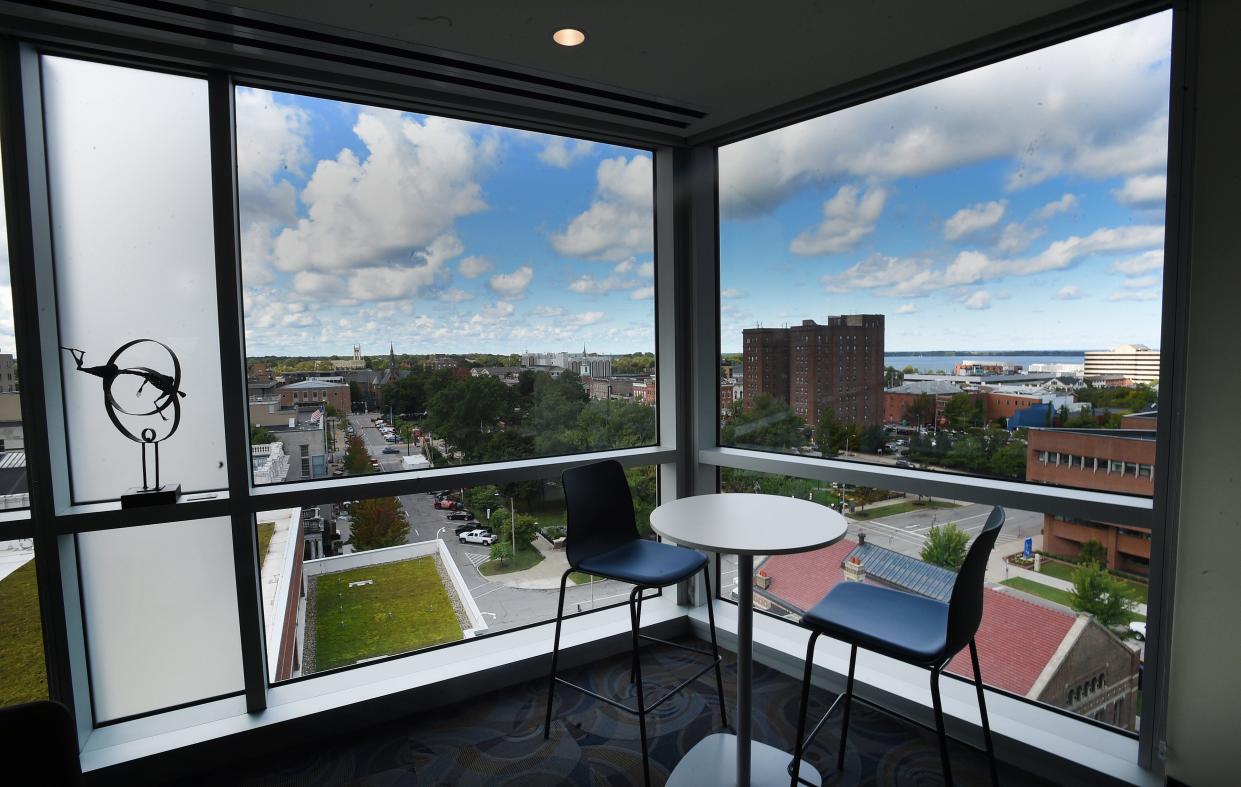Erie Insurance employees to spend more time in the office as definition of hybrid changes
More than 40% of Erie Insurance's 6,400 employees — spread across 12 states and Washington, D.C. — have fully remote roles with the company. That's not going to change.
What will change are the expectations for the rest of its workforce as the Fortune 500 company retools its hybrid work policy that grew out of the work-from-home mandate that began in March 2020 during the early days of the COVID-19 pandemic.
Even when COVID restrictions eased, Erie Insurance was slow to summon workers back to the office. The company solicited volunteers to return first.
More recently, the company adopted a hybrid work schedule that allowed employees to spend as little as two days a week in the office.
That will change with the start of the new calendar year.

Effective Jan. 2, hybrid employees will be given an allotment of 52 days — an average of one day a week — to work remotely each year.
According to a statement from the company, "Working with their leaders, employees will determine how best to use their allotment to balance personal flexibility and preference and meet the business needs of their teams."
Gone will be predetermined schedules for employees who have worked remotely one to three days a week.
Sean Dugan, the company's executive vice president for human resources and corporate services, said Erie Insurance learned a lot about the benefits and limitations of the hybrid schedule over the last year or so.
"Part of what we learned is there was a lot of inconsistency around the employee experience, and that was across the board," Dugan said. "As a company that relies on relationship building, we felt that wasn't as easy to do in a fully remote environment."
That doesn't mean remote workers weren't getting the job done. From the earliest days of COVID-19, Tim NeCastro, CEO of Erie Insurance, said productivity had not faltered.
But there has been a growing recognition, Dugan said, that working in the same space is good for career development and provides opportunities for more senior employees to share their knowledge.
At the same time, the company contends that the new hybrid work plan will provide much of the flexibility that employees have come to appreciate. Employees will be able to choose to work remotely on a particular day of the week or bank remote days to be used several at a time, Dugan said.

"I think time will tell as our employees start to grasp the concept," Dugan said.
“We know our employees appreciate flexibility and the ability to work remotely,” he added. “We also know that working together in person offers significant advantages for our employees and for our business.”
An evolving perspective
NeCastro had long expressed a preference for seeing company employees work from a shared space.
"From its foundation, the company's values center around human relations, the human touch," NeCastro said in a January of 2022 interview with the Erie Times-News. "There is something magical about being in that real dimension. Part of what makes our company special is we attract people who value those interactions."
A year later, another interview found NeCastro coming to grips with the rising popularity of remote work and the company's new policy of hybrid schedules.
Asked about his previous insistence that Erie Insurance employees would work from a common space, NeCastro said, "I am getting over it. I am virtually over it."
Ten months later, NeCastro briefed employees Tuesday morning on the new plan that will require hybrid employees to be in the office 80% of the time.
NeCastro said he understands not everyone will embrace this change with enthusiasm.
But he also said the company has heard from employees who aren't happy with the status quo, describing the hybrid model as "inconsistent, not as engaging and that emptier offices lack vibrancy."
"A workplace that supports richer in-person collaboration, knowledge-sharing and relationship building is foundational to our business model and vital to personal career development," NeCastro said in a statement. "It helps us better understand how ERIE’s values are brought to life.”

Office spaces
It was in the middle of the pandemic that the company completed the new Thomas B. Hagen Building, a 346,000-square-foot structure, built at a cost of $147 million. The new building, located just east of Perry Square, sat empty for the better part of two years after it was completed, including several months after it was dedicated in September of 2021.
Even now, the building, which has space for about 1,200, operates most days at well below capacity. Fridays remain a popular day to work from home, leaving lots of open space at the office, Dugan said.
He expects that to change in January to the extent that the company will have to make full use of the Hagen Building and its other facilities, including a leased location in Penn State Behrend's Knowledge Park and a building at Westport Centre in Millcreek Township.
The need for those spaces is due in large part to ongoing renovations to the F.W. Hirt Perry Square Building, which is in the midst of a $45 million renovation project.
While the company will have made an investment of nearly $200 million in offices, Dugan said that wasn't the driving force behind the company's new policy.
"We know we are at a critical point," he said. "I can't stress enough. It's not about a building. It's about how our team members work."
A growing trend
Erie Insurance, Erie County's largest employer, isn't alone in its plans to have employees spend more time in the office.
According to an August report from the online publication Resume Builder, leaders from 90% of 1,000 companies surveyed plan to return to the office by the end of 2024.
Of those surveyed, 72% said returning to the office has improved revenue. Just 2% said they had no plans to require employees to work in person.
Contact Jim Martin at jmartin@timesnews.com.
This article originally appeared on Erie Times-News: Definition of hybrid work to change at Erie Insurance in 2024


